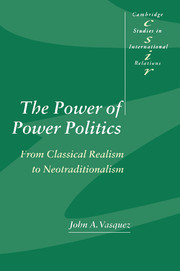Book contents
- Frontmatter
- Contents
- List of figures
- List of tables
- Preface
- Introduction
- Part I The Original Text: Classical Realism and Quantitative International Politics
- Preface to Part I
- Acknowledgments
- 1 The role of paradigms in scientific inquiry: a conceptual framework and a set of principles for paradigm evaluation
- 2 The role of the realist paradigm in the development of a scientific study of international relations
- 3 Research design: defining and operationalizing the realist paradigm
- 4 Theory construction as a paradigm-directed activity
- 5 Data making as a paradigm-directed activity
- 6 Research as a paradigm-directed activity
- 7 Evaluation: the adequacy of the realist paradigm
- 8 Theory and research in the 1970s: the emerging anomalies
- Part II Neorealism and Neotraditionalism: International Relations Theory at the Millennium
- References
- Name index
- Subject index
- CAMBRIDGE STUDIES IN INTERNATIONAL RELATIONS
3 - Research design: defining and operationalizing the realist paradigm
Published online by Cambridge University Press: 22 September 2009
- Frontmatter
- Contents
- List of figures
- List of tables
- Preface
- Introduction
- Part I The Original Text: Classical Realism and Quantitative International Politics
- Preface to Part I
- Acknowledgments
- 1 The role of paradigms in scientific inquiry: a conceptual framework and a set of principles for paradigm evaluation
- 2 The role of the realist paradigm in the development of a scientific study of international relations
- 3 Research design: defining and operationalizing the realist paradigm
- 4 Theory construction as a paradigm-directed activity
- 5 Data making as a paradigm-directed activity
- 6 Research as a paradigm-directed activity
- 7 Evaluation: the adequacy of the realist paradigm
- 8 Theory and research in the 1970s: the emerging anomalies
- Part II Neorealism and Neotraditionalism: International Relations Theory at the Millennium
- References
- Name index
- Subject index
- CAMBRIDGE STUDIES IN INTERNATIONAL RELATIONS
Summary
While the Kuhnian interpretation of the intellectual history of the field, presented in the previous chapter, appears plausible, its accuracy has not been tested in a systematic and falsifiable fashion. This is important because some critics of Kuhn (e.g., Shapere 1964, 1971) have argued that the paradigm concept is so vague and ambiguous that a specific paradigm cannot be easily identified in a discipline. In this chapter these potential problems will be addressed by explicitly deriving testable propositions that must be true if the Kuhnian interpretation of international relations inquiry is true; demonstrating that the definition of the realist paradigm employed in this analysis is valid; and operationalizing that definition so that it is possible to determine which works are guided by the paradigm.
Deriving propositions
If an interpretation is to be adequately tested, it is necessary to ensure that important and not trivial propositions are logically derived from the interpretation and that the research design constitutes a valid test of the proposition. A number of propositions can be found in the interpretation presented in chapter 2. If the more important or controversial propositions in the interpretation are corroborated, there is more confidence in the adequacy of the interpretation than if some less controversial propositions (such as the proposition that the realist displaced the idealist paradigm) were corroborated. The most controversial and important proposition in the historical interpretation is that the realist paradigm has guided international relations inquiry after the behavioral revolt.
- Type
- Chapter
- Information
- The Power of Power PoliticsFrom Classical Realism to Neotraditionalism, pp. 45 - 59Publisher: Cambridge University PressPrint publication year: 1999

